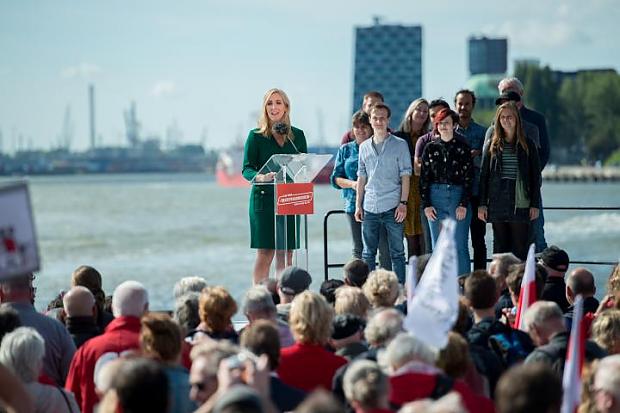It's time for justice!
It's time for justice!

The last forty years have seen little progress in terms of disposable income for most families in the Netherlands. A great many people were already aware of this from their own experience, but the Rabobank, a major Dutch bank, has calculated it precisely.
By SP leader Lilian Marijnissen
Yet our country has grown much richer during these years, with the official statistical bureau reporting that in these four decades GDP has grown by a factor of five. People's incomes have, however, lagged behind when compared to corporate profits. Households are taking an ever-smaller slice of the economic pie, according to the report from the Rabobank. The share of the national income going to 'labour' is shrinking, while the share going to 'capital' grows ever larger. The bank also demonstrates that this is a political choice, as before this period households did indeed share in the benefits of growth.
Rabobank's description of our economy over the last forty years accords to a large extent with the analysis of capital as first made by Karl Marx. In a 'free' market economy the product of labour goes directly to the owners of capital. This is no natural phenomenon or economic necessity, but a political choice. Workers' rights are restricted: in its analysis, the Rabobank points to the 'Wassenaar Agreement' of 1982, when trade unions concluded a deal with the employers to limit wage growth. At the same time multinationals are accorded enormous advantages, such as the abolition of the tax on dividends by the present government of Prime Minister Mark Rutte, which hands billions to shareholders abroad.
Karl Marx described not only the unprecedented power of capital, but also what this meant for the workers and for society. In the capitalist market economy such as developed in the nineteenth century, the workers themselves were a commodity that had a certain 'value' on the labour market, their value as people dissolved into exchange value, as Marx explained. International capital also transformed national societies, “creat(ing) a world after its own image.” Marx foresaw how the interests of capital would increasingly determine national politics and how this would give more power to the market, and how “the subterranean forces which they themselves conjured they are no longer able to control.”
The question is not why capital has acquired so much power; that's a development that Karl Marx long ago described. The question is rather why people continue to accept this growing inequality. You can find an explanation for this too in Marx's work. The market sees people as consumers, who are above all concerned about their own interests. Marketisation forces people to compete with each other and encourages above all the making of as much profit as possible in as short a time as possible. In a society built on marketisation it is primarily individualism, competition and short-term thinking which are encouraged. For other social values, such as cooperation, sustainability and solidarity, 'market-think' has no space.
In my view this is indeed capitalism's greatest power, its ability to have people believe that inequality is logical and that no other world is possible. The most important task for socialists is therefore to demonstrate how people can take their future in their own hands. A small action can have big results. If people see that they can improve things in their own neighbourhood, why should this not be possible on a larger scale? The ruling ideas are good for the ruling class, Karl Marx said. Political change begins with people's awareness that growing inequality is a political choice and that fair sharing is a much better alternative. This is a fight which no party can take up better than can the SP. It's time for justice!
This article by SP leader Lilian Marijnissen is translated from Dutch from the concluding piece in the September 2018 issue of SP periodical Spanning, an edition entirely devoted to examining the continued relevance of Karl Marx's thought to our own times.
